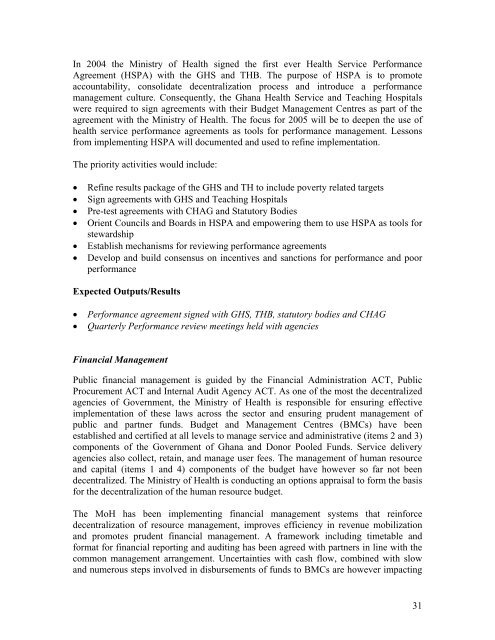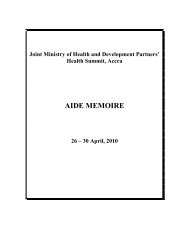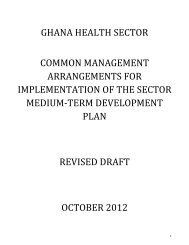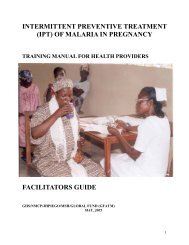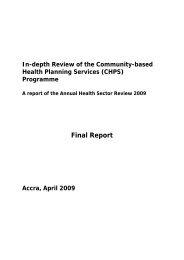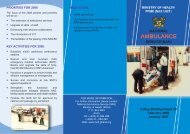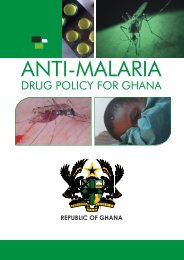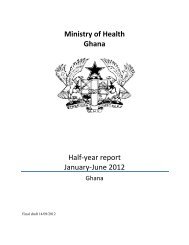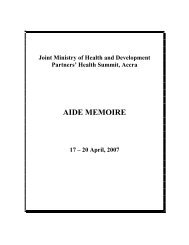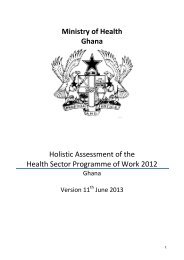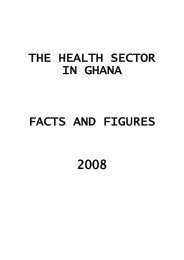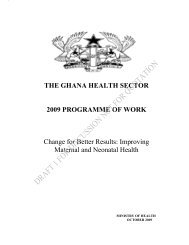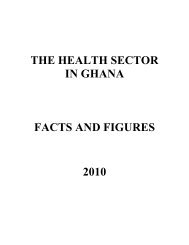Annual Programme of Work 2005 - Ministry of Health
Annual Programme of Work 2005 - Ministry of Health
Annual Programme of Work 2005 - Ministry of Health
Create successful ePaper yourself
Turn your PDF publications into a flip-book with our unique Google optimized e-Paper software.
In 2004 the <strong>Ministry</strong> <strong>of</strong> <strong>Health</strong> signed the first ever <strong>Health</strong> Service Performance<br />
Agreement (HSPA) with the GHS and THB. The purpose <strong>of</strong> HSPA is to promote<br />
accountability, consolidate decentralization process and introduce a performance<br />
management culture. Consequently, the Ghana <strong>Health</strong> Service and Teaching Hospitals<br />
were required to sign agreements with their Budget Management Centres as part <strong>of</strong> the<br />
agreement with the <strong>Ministry</strong> <strong>of</strong> <strong>Health</strong>. The focus for <strong>2005</strong> will be to deepen the use <strong>of</strong><br />
health service performance agreements as tools for performance management. Lessons<br />
from implementing HSPA will documented and used to refine implementation.<br />
The priority activities would include:<br />
• Refine results package <strong>of</strong> the GHS and TH to include poverty related targets<br />
• Sign agreements with GHS and Teaching Hospitals<br />
• Pre-test agreements with CHAG and Statutory Bodies<br />
• Orient Councils and Boards in HSPA and empowering them to use HSPA as tools for<br />
stewardship<br />
• Establish mechanisms for reviewing performance agreements<br />
• Develop and build consensus on incentives and sanctions for performance and poor<br />
performance<br />
Expected Outputs/Results<br />
• Performance agreement signed with GHS, THB, statutory bodies and CHAG<br />
• Quarterly Performance review meetings held with agencies<br />
Financial Management<br />
Public financial management is guided by the Financial Administration ACT, Public<br />
Procurement ACT and Internal Audit Agency ACT. As one <strong>of</strong> the most the decentralized<br />
agencies <strong>of</strong> Government, the <strong>Ministry</strong> <strong>of</strong> <strong>Health</strong> is responsible for ensuring effective<br />
implementation <strong>of</strong> these laws across the sector and ensuring prudent management <strong>of</strong><br />
public and partner funds. Budget and Management Centres (BMCs) have been<br />
established and certified at all levels to manage service and administrative (items 2 and 3)<br />
components <strong>of</strong> the Government <strong>of</strong> Ghana and Donor Pooled Funds. Service delivery<br />
agencies also collect, retain, and manage user fees. The management <strong>of</strong> human resource<br />
and capital (items 1 and 4) components <strong>of</strong> the budget have however so far not been<br />
decentralized. The <strong>Ministry</strong> <strong>of</strong> <strong>Health</strong> is conducting an options appraisal to form the basis<br />
for the decentralization <strong>of</strong> the human resource budget.<br />
The MoH has been implementing financial management systems that reinforce<br />
decentralization <strong>of</strong> resource management, improves efficiency in revenue mobilization<br />
and promotes prudent financial management. A framework including timetable and<br />
format for financial reporting and auditing has been agreed with partners in line with the<br />
common management arrangement. Uncertainties with cash flow, combined with slow<br />
and numerous steps involved in disbursements <strong>of</strong> funds to BMCs are however impacting<br />
31


